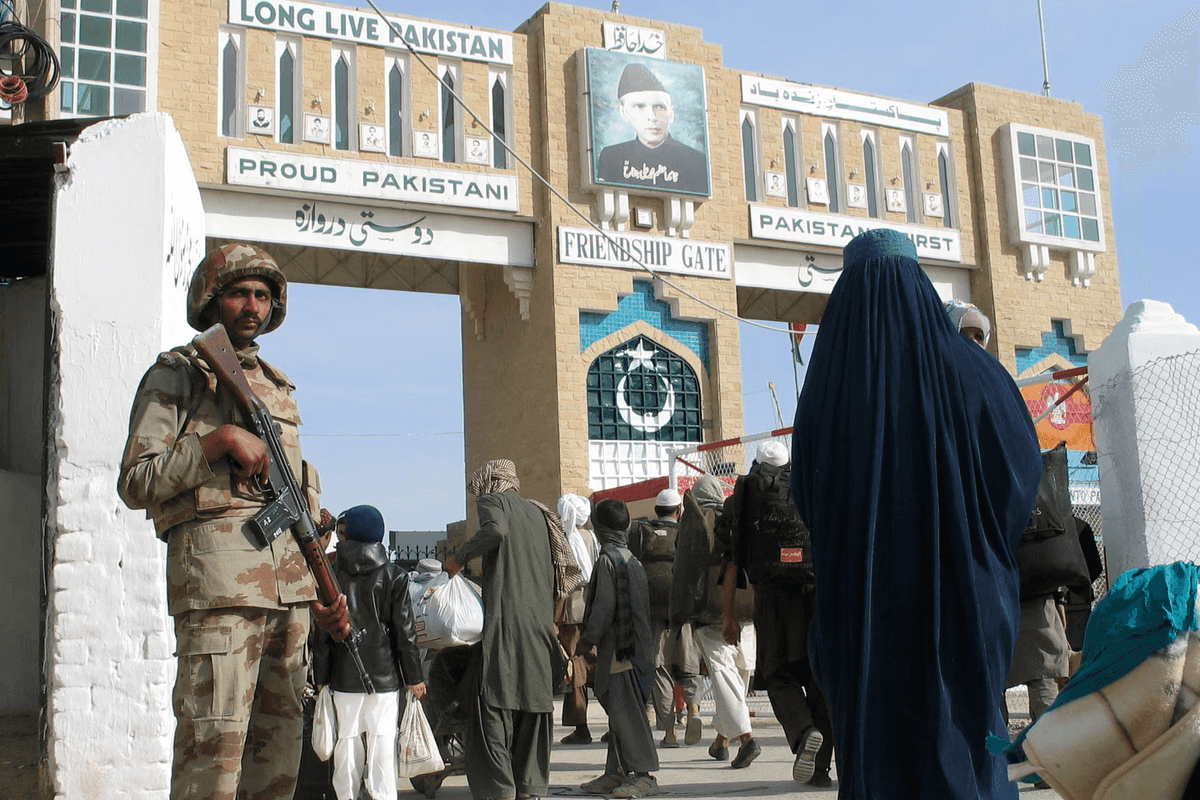Afghan visa scandal triggers investigation in Pakistan
At the center of the scandal are claims that hundreds of Afghan nationals were issued exit visas without official entry records, a charge the Interior Ministry denies as fabricated lies

Shahzad Raza
Correspondent
Shahzad; a journalist with 12+ years of experience, working in Multi Media. Worked in Field, covered Big Legal Constitutional and Political Events in Pakistan since 2012. Graduate of Islamic University Islamabad.

A Pakistani soldier keeps guard at the Friendship Gate, a crossing point on the Pakistan-Afghanistan border at Chaman.
Reuters
A sweeping e-visa fraud involving Afghan nationals has rocked Pakistan’s Ministry of Interior, revealing a web of corruption spanning multiple government departments.
At the heart of the scandal are allegations that hundreds of Afghan citizens were granted exit visas without any formal record of entry into the country.
Sources told Nukta that a coordinated syndicate of Afghan e-visa agents was working in collusion with officials from Pakistan’s Ministry of Interior (MoI), Ministry of Foreign Affairs (MoFA), and the Ministry of Information and Broadcasting. The network is believed to have facilitated the illegal issuance of Pakistani visas to Afghan nationals on a significant scale.
The Federal Investigation Agency (FIA) has launched an extensive investigation into the matter. Two government officials -- Samiullah Khan, an employee of the Ministry of Foreign Affairs, and Nadir Raheem Abbasi, associated with the Press Information Department -- have already been arrested from Islamabad’s G-8 sector.
Investigators have also identified senior MoI personnel as suspects, including a section officer and a deputy secretary working in the visa section. The inquiry has expanded to examine the role of a MoFA official stationed at the Pakistani Embassy in Kabul, who allegedly helped channel around PKR 40 million into a bank account titled “Car Pro”.
The amount, transferred on behalf of an individual named Samiullah Afridi, is suspected to be payment for processing fake visa applications.
Stolen identities, fake sponsors, unregulated money flows
The fraudulent operation reportedly used stolen CNIC numbers and fake sponsors to secure e-visas for Afghan nationals, often delivering results within 24 to 48 hours -- bypassing mandatory vetting by intelligence and security agencies.
The syndicate monetized these services through a tiered pricing scheme: urgent tourist visas within 24 hours were issued for $750 (of which 80% reportedly served as commission for MoI employees), while regular tourist, medical, and business visas were priced at $350 each, with delivery timelines ranging from 10 days to two weeks.
FIA officials also confirmed that the scam involved systematic identity theft, with the personal details of Pakistani citizens misused without consent to create fake visa sponsorships. This has raised alarms within both national security and digital privacy watchdogs.
Adding to the concern, investigators revealed that payments linked to these fraudulent applications were funneled through unregulated informal money transfer systems such as Hawala and Hundi, thereby evading oversight from Pakistan’s formal financial institutions and raising further red flags with the country’s financial intelligence units.
In response to the unfolding scandal, the Ministry of Interior has begun reshuffling key posts. Sources confirmed that control over sensitive areas, including the visa and border management sections, has been reassigned.
These responsibilities, previously under the additional secretary for border management, have now been divided among the additional secretaries for Administration and Internal, and Foreign Security.
Meanwhile, the FIA is expanding its probe to cover visa records from the past three years in an effort to fully map the extent of the network. Additional transfers and new appointments to critical border security positions are expected in the coming days as authorities move to tighten oversight.
In a statement, the Interior Ministry denied media reports circulating about the visa scandal, calling them “fabricated lies and propaganda.”
The ministry clarified that entry visas for Afghan nationals were issued by the relevant embassy, and that the FIA has already registered an FIR against those involved in the scandal, with an investigation currently underway.







Comments
See what people are discussing